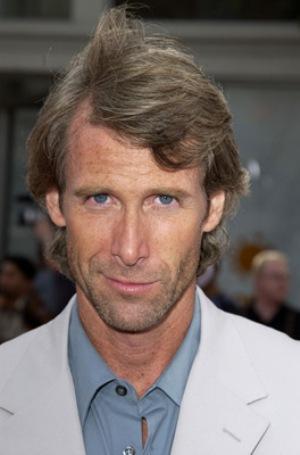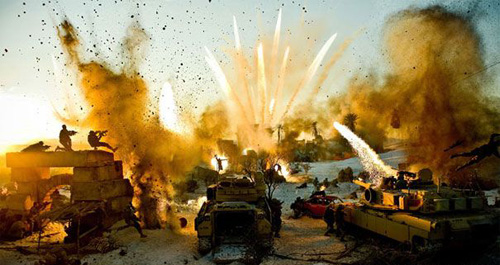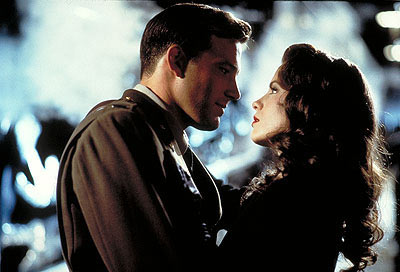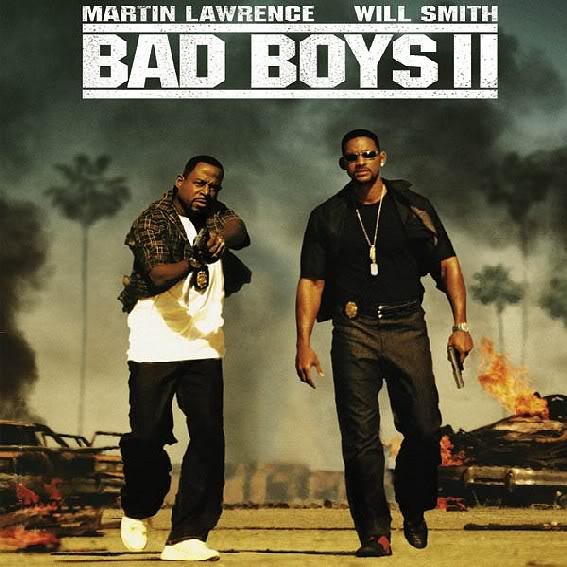LEAVE MICHAEL ALONE!

You're not helping with that douche-bag smile.
Michael Bay has officially reached “hate for the sake of hating” status. He shall claim his award along side Dane Cook and Carlos Mencia and Stephenie Meyer at some point to be determined later.
Don’t get me wrong. Much of the hate is warranted. His movies are overly bombastic, erratic, and overly straightforward in the most clichéd and inane ways possible. Immature. One-dimensional. Style with no substance.
And yet, I feel obliged to at least defend him in some way, something I thought I would never do in all my years. Why? Well, part of the reason is this somewhat harsh review on one of my childhood favorite films. I love that website, and I agree with a good chunk of what the author said, but I can’t help but feel it’s just another drop in the post-hate diatribe wave on Michael Bay before he became MICHAEL BAY. Bad Boys was one of his earliest films, and it’s a lot of fun without the inanity of masturbation jokes that fill Transformers. But, more on that in a second.
As the title implies, I also think that the combination of critic dislike and nerd rage has pushed Bay past the point of generic director who likes explosions to the epitome of everything that’s wrong about Hollywood and the demise of humanity as we know it (an award I’d give to Shyamalan, but I digress). The purpose of this piece is essentially to try and wean off some of the unadulterated hate on Bay with a hopefully less-biased argument, beyond simply writing it off as “mindless entertainment.” I’m not trying to get him into heaven, just not send him to hell. I’ll be Henry Fonda. Let’s see if I can convince the rest of the jury.

And boom goes the dynamite.
Bay’s obsession with explosions is nothing new. Nor are explosions themselves. Action movies tend to utilize generic explosions for no reason because it puts the hero up against a cinematic timer. Stopping the villain isn’t enough. You gotta get the hell out of there.
The explosion is the 80s and 90s version of Hitchcock’s “bomb under the table” argument for good suspense. Action movies ratchet up the suspense angle to incredible degrees—we know whodunit, so now it’s just life-versus-death. In this case, the bomb has gone off, and it’s more akin to a “fireworks within the buildings” argument, as applied to such films. There’s nothing inherently wrong with them, really, and although Bay uses them so often, he doesn’t use them as much as everyone claims. His movies usually have one major one, with some minor ones here and there. Of course, they’re complimented with a lot of destruction in the forms of car crashes, demolitions, and insane shootouts. Excessive, yes. Mindless, yes. Contextually, though, they work, since upping the ante is important to a credible climax, the perfect satisfaction for something high-geared anyway. I love Die Hard, but you would be hard-pressed not to admit the endings to all four of them are rather weak, when compared to the intense action that occurs prior to them. (Even the first one—though it’s still a damn cool ending.)

The word "bromance" didn't exist back then.
The criticism leveled towards Bay’s machismo heroes and sexualized females is warranted. Imagine Fast and the Furious, times a million. Wait. Let’s imagine Fast and the Furious. Seems to utilize the same idealization of male/female roles, and in my opinion, makes them worse, by dumbing them down into the fetishization of illegal street racing. Bay isn’t doing much different than that. Catering to the lower common denominator isn’t new, and to pretend we as a society should always expect great cultural significance from a medium that certainly doesn’t require it (especially from him) is bonkers. Remember when everyone said they’d like fresh, healthy choices at their local fast food restaurant, and then no one ate them? We talk a good game, but we certainly won’t practice it. So why are we pretending Bay played off this idealization first, despite the fact that we’ve been getting forms of this during the 50s? Saying “that’s all he does” is true, but irrelevant. You may claim that Hitchcock played with the ideas of fetishizing male/female dynamics, but the fact that he verbally abused his female leads doesn’t exactly vibe well. “He did it for intellectual purposes” is not a good excuse.
Another thing to consider is that one can’t really take the buddy-action-comedy film to any greater length other then to devise some off-note conflict between them that’s eventually solved by the final reel as they dispatch the main bad guy. In the case of Bad Boys, in particular, Martin Lawrence and Will Smith clearly had such a great chemistry together that I think it’s impossible to imagine it any other way. And straight-laced Connery vs. goofy-as-always Cage in The Rock was truly a lot of fun. Say what you will about their comedy (I loved it, personally), but they certainly didn’t clash, like say, Keenan Ivory Wayans and Steven Segal.
And besides, he doesn’t write these things. He influences them a lot, sure, but it’s the screenwriters who put that nonsense on paper.

My favorite part was when they cut to the credits.
Okay. I will accept all the dislike on Bay to a certain extent, but the editing criticism is one I absolutely disagree with. Bay’s so-called frantic, unclear, and nonsensical editing/cutting is dead wrong. I have never seen a Bay movie where I was completely befuddled to the continuity of the action. Hell, I was more confused watching Batman Begins and the Bourne movies than any of Bay’s high-intensity flicks. I’m not even sure where this complaint came from.
Editing isn’t much discussed or understood outside film/TV circles, so I’ll keep this simple. There are basically two types of editing: classical Hollywood style, which is what everyone is used to, which makes cuts between moments so smooth and seamless that you’re not supposed to notice them; and there’s Sergei Eisenstein’s style, a film theorist who not only popularized the concept of the montage back in the 1920s, but theorized that editing is not about being invisible but striking—the cuts should be noticeable, and should impact the viewer as much as the scenes themselves.
I doubt Bay is even aware that film existed earlier than 1980. But what I’m arguing is that even if his films don’t make sense to the average viewer in terms of continuity, the impact that those cuts cause must mean something on a visceral level. Bay’s editing is geared where each individual character has a “moment” to succeed at some point, before cutting hard to the next character, and so on. It’s sloppy but effective in the Eisenstein way, and it’s not as if action, horror, or disaster movies aren’t adverse to that idea, like in, again, Batman Begins and the Bourne movies (Terrence Malick films are prone to that style, too).
Besides, I’ve seen worse editing before. Check out this scene from Bad Boys:
Makes sense to me. Now, check out this retardedly high-intense-cut nonsense from Something’s Gotta Give (apologizes for making you watch any part of this movie):
Ugh. That just makes me cringe.

Well, at least the soundtrack was decent.
I must emphasize that this isn’t a defense on Michael Bay. His movies are nice for a quick netflix pickup—a one-and-done kinda deal. And to be honest, there does seem to be at least a modicum of semi-appreciation for The Rock, a little less for Bad Boys, and even less-but-still-present for Armageddon. But I don’t think the utter amount of vitriol he gets is necessary. With these two things in mind, one thing is clear: Bay, please go back to making R-rated movies. PG-13 is holding you back. We need more great lines like “Losers whine about doing their best. Winners go home and fuck the prom queen.”
Comments are closed